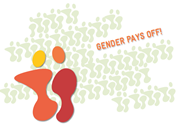Gender meets Religion Religious Actors and Gender Equality
On March 6th, the Sector Programme Values, Religion and Development hosted an event in collaboration with GIZ Principal Gender Officer Angela Langenkamp and the GIZ Representation on the role of religion for gender equality in the context of international cooperation on the occasion of GIZ’s Gender Week. More than 45 practitioners and academics gathered in GIZ’s Berlin representation to debate how and to which extent religious actors can promote gender equality and women’s rights to achieve the Sustainable Development Goals.
Religion has a strong societal and political impact on the thoughts and actions of billions of people. Religious Actors and Faith-based Organisations are among the most important civil society actors in many of Germany’s partner countries in development cooperation. As an ambivalent societal force, religion can be a motor or inhibiting factor for sustainable development. Regarding gender equality, religion plays a prominent role, because assigned gender roles often are influenced by religious convictions. Therefore, the five expert panelists focused their inputs on the vital role Religious Actors can play in challenging narratives, ending harmful practices and promoting Gender Equality on the ground. Through concrete examples of best practices, they contributed to a broader understanding of the potentials, challenges and risks cooperation with Religious Actors can have.
Christo Greyling, Director of Faith Partnerships for Development at World Vision International presented examples from Kenya, where maternal and infant health were improved through the Channels of Hope method. He provided unique insights in the development of this methodology which catalysis faith leaders to respond to difficult development issues such as gender.
Tanja Haque, Global Gender Advisor at CAFOD (Catholic Agency for Overseas Development) presented a toolkit developed in a participatory way engaging both practitioners as well as women and men of faith in partner countries. The toolkit works on four levels – individual, family, community, society – and allows partners to reflect on gender roles and change harmful practices through the “pastoral cycle” of seeing, judging, acting and celebrating. These steps do not require outside experts, but rather build on individuals’ and groups’ own reflections of their convictions and practices in light of teachings found in the bible.
Sabrina Khan, Head of Program Division at Islamic Relief Germany elaborated on her organization’s strategy building on Islamic belief to guarantee both the equal value and importance of women, girls, men and boys as well as the importance of equity in treatment of all people, regardless of their status. She then showcased an example from Ethiopia, where Imams were successfully encouraged to address GBV in their sermons at Friday prayers to raise awareness and to promote a violence free environment for women and girls.
Reverend Domnic Misolo, Founder of ‘Ekklesia Foundation for Gender Education’ gave a personal account of how he grew up in a society in which women and girls are frequently without rights. He explained how his feminist reading of the bible showed him that the holy scripture does not allow for any kind of discrimination. Subsequently, he challenged and changed his church’s own teachings, leading to the ordination of women as priests. He narrated how he not only started community programmes for girls’ education, but also how his own “traditional” family changed to be a home of equality, when his wife went on to become a teacher next to being a mother.
The last speaker, Dr Nadja Jacubowksi-Torres, CIM-IF and Advisor on Gender Equality and Children’s Rights at the Indonesian Ministry of Women’s Empowerment and Child Protection spoke about a „fight of concepts“ between traditional narratives and concepts such as the Human Rights or the 2030 Agenda, which can create a backlash of rejecting the “new” and reinforcing traditional norms. Elaborating on the concrete example of female genital mutilation, she showed that it is key to review sources legitimating practices and then offering alternative sources in holy scripture and religious teachings rather than simply putting a new doctrine in place. Through this, religious feminism is not seen as a foreign intervention, but gives faith leaders and believers a choice instead of a top-down narrative.
Following this round of presentations, the audience got into a lively exchange with the panelist in a World Café. Identifying key challenges, opportunities and limitations of cooperation, all groups emphasized the inclusion and support of men as advocates of Gender Equality as crucial for lasting results in particular in the often male-dominated environment of faith leaders. Summarizing the presentations from the World Café groups, Ulrich Nitschke identified the search for common ground among all involved actors while allowing for a difference in cultural backgrounds and beliefs as a key to durable results.
For more information please read the GIZ Intranet summary!
Have a look at the Video “Channels Of Hope; Addressing Gender-based Violence in the Solomon Islands“2018 Cafod Presentation Dignitytool 2018 Greyling Presentation GenderAndReligion 2018 IRD Presentation GenderMeetsReligion 2018 JacubowskiTorres Presentation GenderMeetsReligion

 GIZ Gender Website
GIZ Gender Website















